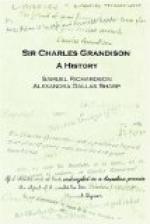Her face glowed. Miss Byron, said she, in French, is all loveliness. A relation, sir? in Italian.
He bowed; but answered not her question.
I would sooner forgive you here, whispered Lady Olivia
to Sir Charles, in
Italian, looking at me, than at Bologna.
I heard her; and by my confusion shewed that I understood her. She was in confusion too.
Mademoiselle, said she, in French, understands Italian.—I am ashamed, monsieur.
Miss Byron does, answered Sir Charles; and French too.
I must have the honour, said she in French, to be better known to you, mademoiselle.
I answered her as politely as I could in the same language.
Lady Olivia is really a lovely woman. Her complexion is fine. Her face oval. Every feature of it is delicate. Her hair is black; and, I think, I never saw brighter black eyes in my life: if possible, they are brighter, and shine with a more piercing lustre, than even Sir Charles Grandison’s: but yet I give his the preference; for we see in them a benignity, that hers, though a woman’s, has not; and a thoughtfulness, as if something lay upon his mind, which nothing but patience could overcome; yet mingled with an air that shews him to be equal to any thing, that can be undertaken by man. While Olivia’s eyes shew more fire and impetuosity than sweetness. Had I not been told it, I should have been sure that she has a violent spirit: but on the whole, she is a very fine figure of a woman.
She talked of taking a house, and staying in England a year at least; and was determined, she said, to perfect herself in the language, and to become an Englishwoman: but when Sir Charles, in the way of discourse, mentioned his obligation to leave England, as on next Friday morning, how did she and her aunt look upon each other! And how was the sunshine that gilded her fine countenance, shut in! Surely, sir, said her aunt, you are not in earnest!
After dinner, the two ladies retired with Sir Charles, at his motion. Dr. Bartlett, at Lady G——’s request, then gave us this short sketch of her history. He said, she had a vast fortune: she had had indiscretions; but none that had affected her character as to virtue: but her spirit could not bear control. She had shewn herself to be vindictive, even to a criminal degree. Lord bless me, my dear! the doctor has mentioned to me in confidence, that she always carries a poniard about her; and that once she used it. Had the person died, she would have been called to public account for it. The man, it seems, was of rank, and offered some slight affront to her. She now comes over, the doctor said, as he had reason to believe, with a resolution to sacrifice even her religion, if it were insisted upon, to the passion she had so long in vain endeavoured to conquer.
She has, he says, an utter hatred to Lady Clementina; and will not be able to govern her passion, he is sure, when Sir Charles shall acquaint her, that he is going to attend that lady, and her family: for he has only mentioned his obligation to go abroad; but not said whither.




